Ahhh. There’s nothing like a sip of hot coffee in the morning while watching your flock graze upon thy lands.
Watch them forage. Watch them free range.
But seriously, chickens’ free ranging on grass or pastures has such a huge positive impact on their health and wellbeing it shouldn’t be overlooked.
Although it’s unlikely chickens will complain about the type of grass they’re grazing on, the type of grass does actually matter – both for the well-being of your chickens and for the durability of your lawn!
Here’s which grass is considered the best for raising chickens, why the type of grass matters, and some essential grass and lawn care tips for chicken owners.
Contents
Do Chickens Need Grass?
Look, it’s not like it’s impossible to raise chickens without grass to free range on. Chickens can be raised on all sorts of ground, from dirt, woodland, shrubbery, and pastures.
However, raising chickens on grass has a handful of benefits over most other environments.
Firstly, chickens frequently peck and nibble at the grass as a part of their daily diet, extracting important nutrients from carbohydrates to protein, vitamins, and minerals.
Not only does grass itself have important nutritional content for your chickens, but it contains a whole smorgasbord of insects and organic matter for your chickens to feast on.
Lastly, all this food within the grass acts to encourage your chickens to remain active – certainly getting their “steps” in for the day by doing laps around your whole backyard.
So, although chickens don’t NEED grass, it really does wonders for their overall health and wellbeing.
After all, a happy chook means a happy owner, right?
Does The Type Of Grass Matter For Raising Chickens?
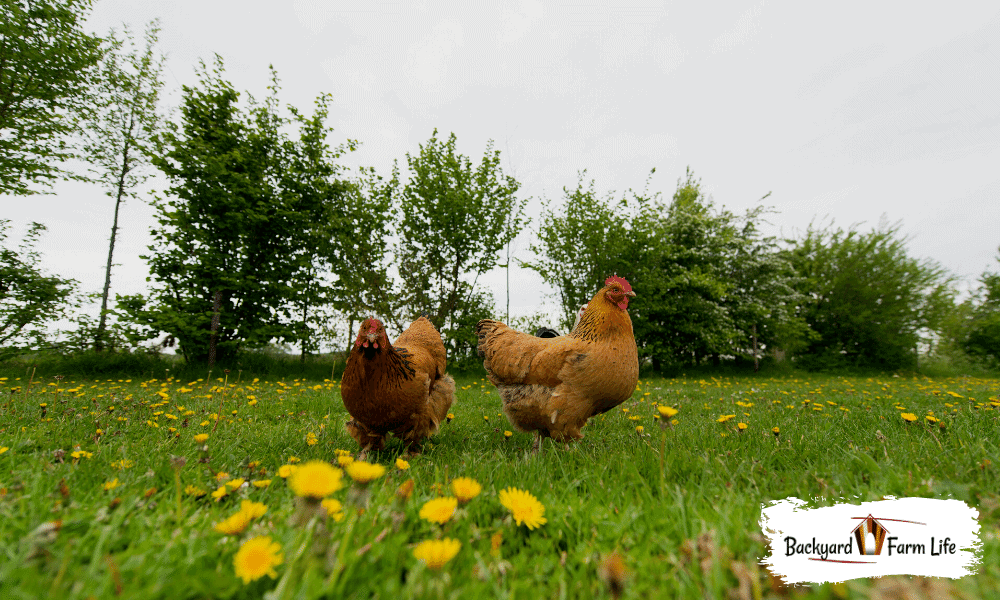
Some would say we’re getting a little pedantic talking about the quality of grass and how it impacts the raising of chickens. But, the truth of the matter is, that the type of grass does matter for raising chickens.
Different grasses have different nutritional contents and some are safer for chickens to consume than others.
Plus, different grasses also grow at different speeds and thrive in different environments. This helps with the overall grazing capability it provides for your chickens.
Not to mention, chickens can be somewhat destructive to lawns and gardens. Any chicken owner will be quick to confirm this.
So, the type of grass can also play a huge part in how resistant it is to your chicken’s daily foraging routines, ensuring it’s growing fast enough and is thick enough to withstand your chickens scratching it.
That’s why the type of grass does matter!
Top 5 Best Types Of Grass For Raising Chickens
So, it’s clear the type of grass can have some big effects on raising chickens.
Without further adieu, here are the top 5 best types of grass to raise your chickens on, factoring in nutritional content, grazing capability, and resilience to constant chicken scratching!
White Clover
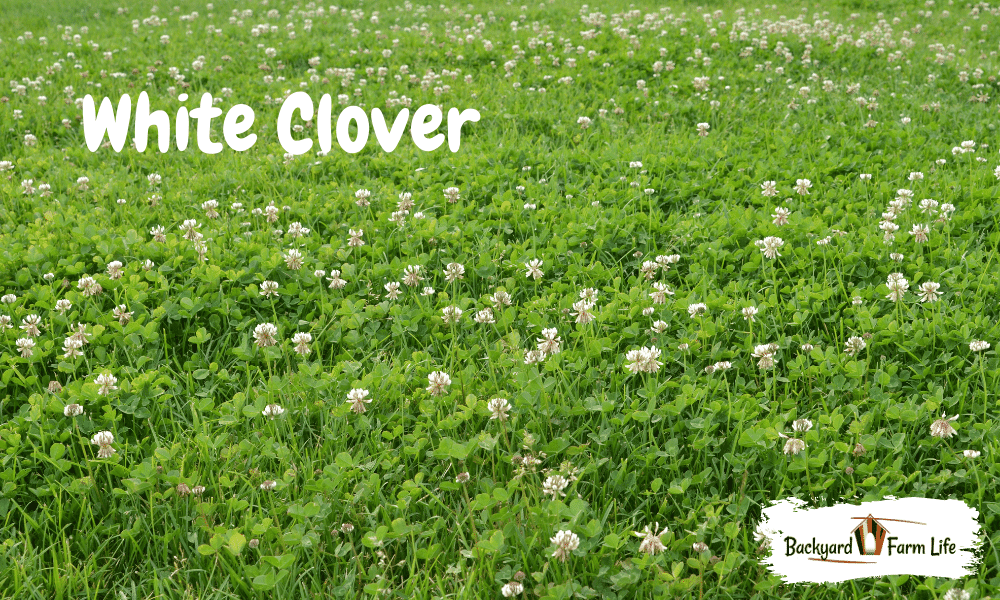
White clover is an amazing alternative to a standard grass lawn.
It’s thick and luscious, and the whites of the flowers are beautiful when they bloom. Amazing for you and your chickens.
Of course, white clover isn’t a normal grass lawn, do expect a fair few small clovers to pop up. But your chickens will absolutely love it.
White clover is completely safe for chickens to consume, from the roots all the way to the blossoms. It’s also safe for humans and other pets too — so no need to worry about any kind of toxicity issues.
White clover doesn’t fair well in extremely dry conditions, which is the only additional consideration to make.
Kentucky Bluegrass
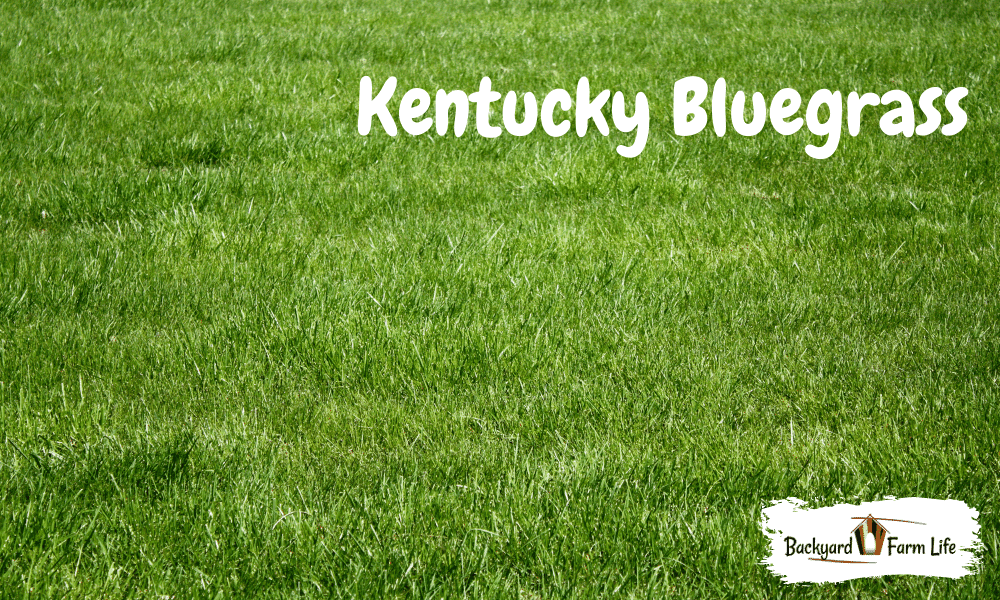
Kentucky bluegrass is a perennial herbaceous grass that is known for its hardiness and tolerance.
Great to resist the hard grazing of chickens.
It really is safe to say it’s one of the most resistant to a chicken’s constant scratching and foraging, making it a wonderful choice for those that want to maintain their lawn AND raise chickens.
The affordable grass flourishes easily, is an attractive green color, and is completely safe for chickens to consume in normal amounts.
Kentucky Bluegrass grows easily in most of the central, north, and northeastern regions of the US making it super easy to maintain without too much effort.
Perennial Ryegrass
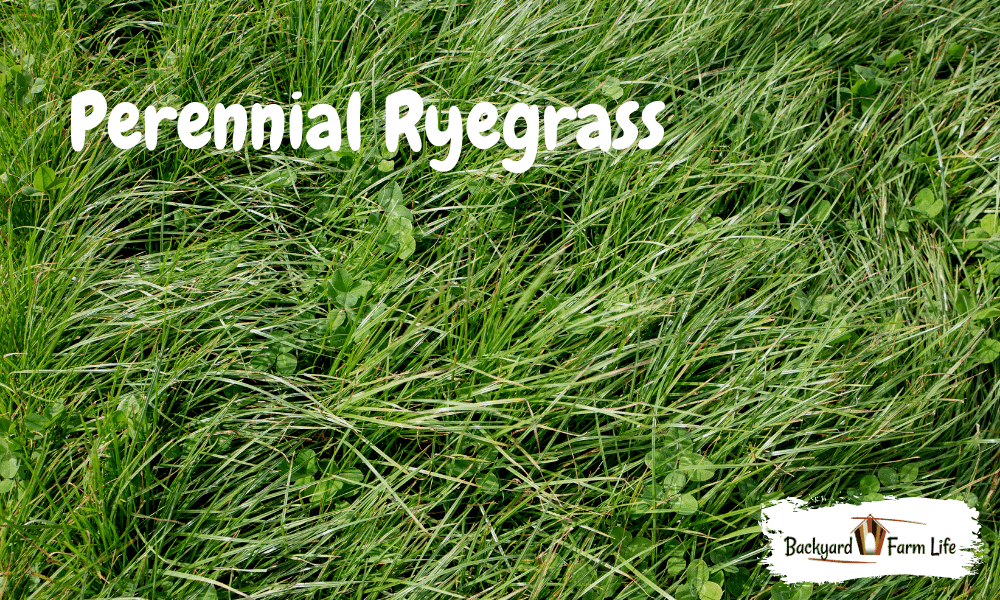
Alright, here’s one for those cooler climates. Perennial Ryegrass is an incredible alternative to standard grass, being safe for chickens and having good nutritional value.
Ryegrass is quick to germinate and grow, making it excellent for withstanding the constant scratching from chickens!
Overall, it’s great for chickens to forage on, free range on, and consume! Plus it can outlast and regrow before your chickens can completely widdle it down!
That’s a win-win in my book.
Fescue
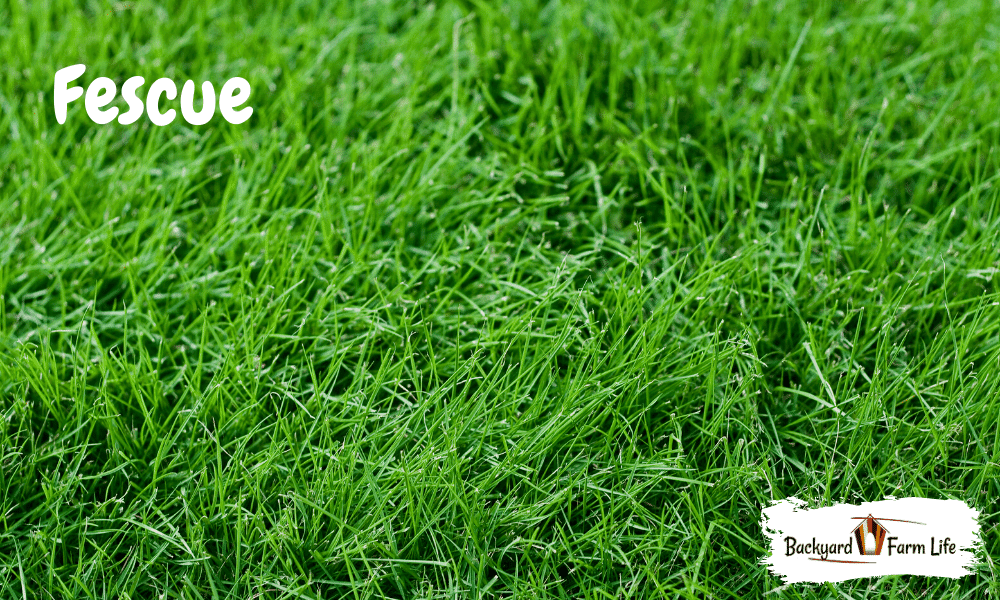
For those areas that experience all four seasons at their truest, hot, cold, or rainy, Fescue grass makes for a perfect pick that will remain resilient all year round.
It’s safe for chickens, grows well in any climate, and is more resistant than other grasses.
Although it can get rather thick when it’s long, your chickens will love free ranging and getting deep into the roots to find insects and other creepy crawlies to eat.
Chickens will help it from growing out of control too, without whittling it down too much!
Birdsfoot Trefoil

Lastly, if you’re looking for a decent alternative to high-quality grass like Ryegrass or White Clover, you might want to consider Birdsfoot Trefoil.
It’s completely safe for chickens to graze on and consume and is known to be rich in protein.
Birdsfoot Trefoil often appears in clumps around lawns, and for chickens, that’s a perfect place to go foraging.
It’s resistant to chickens scratching and is considered low maintenance too!
Thumbs up for Birdsfoot Trefoil.
How Much Grass Do Chickens Need?
Although chickens don’t NEED grass in order to survive, they’ll certainly be thanking you for it through their eggs and chirpy companionship.
What’s more, is that chickens don’t even need much grass, really.
Whether it’s grass, other open space, or a mix of both, you should try to offer your flock 10-15 square feet of space per chicken.
However, the more grass you offer them, the more likely it will withstand their foraging and scratching routines – so keep that in mind!
Grass And Lawn Care Tips For Raising Chickens
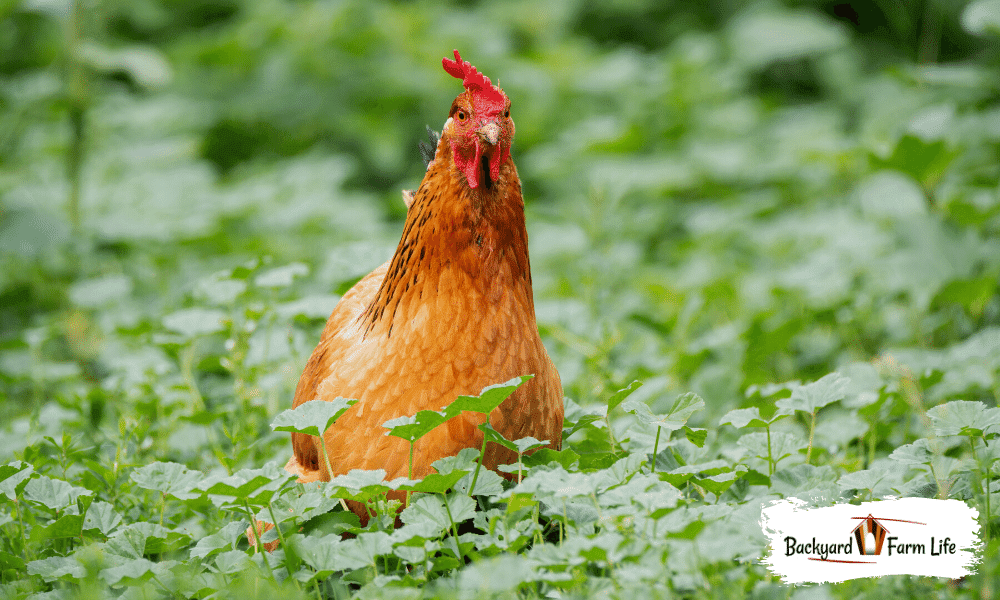
I’ve experienced firsthand the difficulty of maintaining a lawn during winter, with my entire flock going hard on one particular section of my lawn.
Believe me, it was not a pretty sight. Luckily, when summer came around the grass quickly regrew and filled in the weak spots on my lawn!
From a farm to a homestead, to a backyard, here are some quick grass & lawn care tips for raising chickens.
Don’t Use Artificial Grass
Although it sounds like a good idea, artificial grass is far from suitable to raise chickens on.
Unlike real grass, artificial grass has no natural filtration system. So as you can imagine, things start to get messy, smelly, and unhygienic real quick.
Artificial grass also heats up abnormally and may be toxic if consumed by chickens.
To put it simply, just avoid artificial grass if you are raising chickens where possible.
Be Careful Using Fertilizers
Fertilizers can be a homeowner’s best friend when it comes to restoring their grass to its former green glory.
Although some fertilizers claim to be safe around animals, if chickens consume fertilizer or recently fertilized grass, it can lead to some unpleasant health complications.
So you need to be extra careful when using fertilizers around your chickens!
Be Careful Using Garden Lime
Organic garden lime is often used in and around chicken coops to draw excess moisture away, keep things smelling pleasant, and help deter unwanted pests.
However, some types of garden lime are highly toxic to chickens
For this reason, it’s generally recommended to avoid using any kind of garden lime, unless you are certain it’s 100% organic and safe for animals!
Be Prepared For Damage
Grass isn’t chicken-proof. Naturally, their digging and scratching behavior will be destructive to your grass. Luckily, this also acts to spread grass shoots everywhere, which can help with new grass growth.
However, a fair warning is that you should expect some damage to your lawn.
This is why, if you have an option as to which lawn or grass to have on your property, pick one that’s chicken resistant. One that grows fast and thick, and that’s safe for chickens to forage on.
Happy Farming!
Who would have thought grass would be so crucial to a chicken’s well-being?
We would. We chicken owners who simply want the best for our flock.
That’s why, if you have an option, you should look to grow the best grass for your chickens. One that is safe for chickens to eat, grows well in your environment and climate, and one that grows quick enough and thick enough to withstand your chicken’s daily foraging routine!
White Clover, Kentucky Bluegrass, Perennial Ryegrass, Fescue, and even Birdsfoot Trefoil are all amazing grasses for raising chickens on.
But, chickens will be happy with most types of grass as long as they get to spend some time on it!
